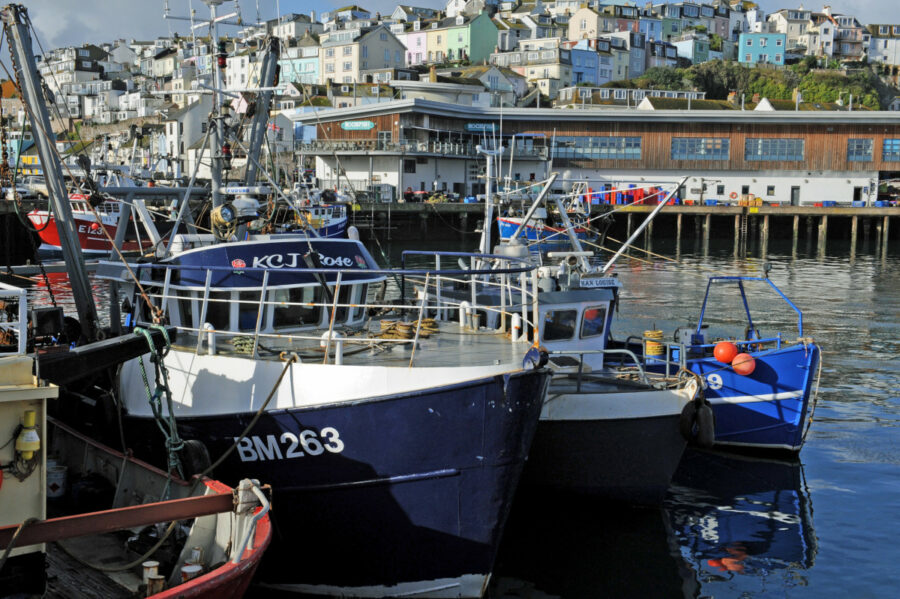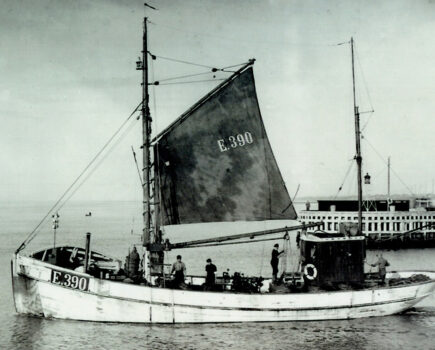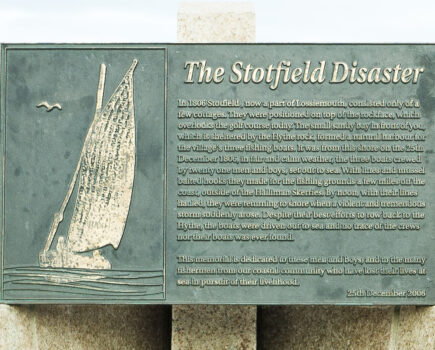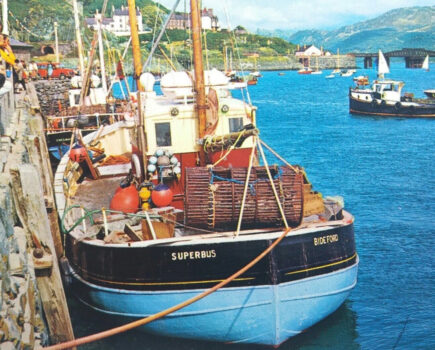Ports in the South West of England are back to steady landings and sales after the cuttlefish boom – but shifting stocks and Brexit uncertainties are making this an unsettled year
Few, if any, South West fishermen would deny that climate change is taking its toll.
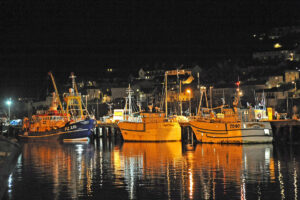
Newlyn harbour at rest.
Traditional patterns of distribution and abundance of inshore stocks have changed to such an extent that skippers now see some species as an addition to their yearly income rather than a directed fishery.
Species like lemon sole and mackerel – which once underpinned the wages of so many inshoremen – are no longer predictable. Species such as bluefin tuna have arrived in numbers off West Cornwall – but without British quota, South West fishermen cannot profit from them. Nevertheless, despite the high mortality rate, a university-backed tagging programme is being allowed to progress, further angering both fishermen and charter-boat owners.
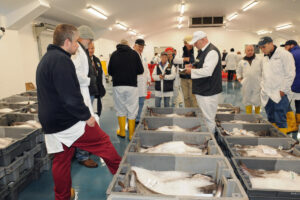
Newlyn has reported steady sales and prices from recent markets.
Deepwater boats such as beam trawlers are seeing less of a change in patterns. On some species, the Channel stocks have improved by a marked amount, yet quotas remain out of step. It is clear to the industry that the ‘science’ used by ICES does not always reflect the changes seen by fishermen.
Non-pressure stocks such as scallops, cuttlefish and shellfish have attracted more effort to those fisheries. Small to medium-sized vessels have become attractive investments to many skipper-owners or small vessel-owning companies. Yards such as C Toms & Son have benefited from that, but confidence for the future is limited. Many yard owners fear that a wrong direction taken in the Brexit process may thwart any future demand.
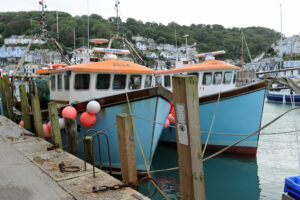
Ella FY 24 and Natalie FY 602 in Looe harbour.
Changes in shellfish distribution are also apparent; crab stocks were again slow in arriving, through lobster stocks are more abundant. Prices of crab reflect how UK processing firms are struggling to get their raw product – so much so that several new vivier potters are under build, both in Britain and Asia. Retail prices for freshly picked white crab meat have soared, often over £50/kg in some shops, but demand for crab is still strong.
Shellfishermen have seen prices paid for good hen crab double, or more, and the growing demand for live crab being flown to China is increasing, with many hoping that it may, in time, provide a new alternative to European export markets.

Local and visiting boats berthed three abreast in Plymouth harbour.
A serious threat to the future of South West fishing is Brexit. Over 70% of fish and shellfish caught in the region is exported, with Europe taking the biggest chunk. Government documents have recently been issued to all vessel owners, spelling out the procedures once Britain leaves the EU, but in truth, the powers that be are only guessing what the future may hold, and what deals may be made.
While the region’s fishermen are almost all Brexiteers, merchants fear that while any Brexit backlash from the Continent may be a short- to medium-term issue, long-term damage to their business is inevitable. Even without hostility, exports may be halted by ferry delays, resulting in fish rotting in lorries or shellfish mortality in vivier trucks.
New web auction is working well, says BTA
Following the recent introduction of a ‘web clock’ auction at Brixham, the number of buyers has increased, says Barry Young, managing director of Brixham Trawler Agents (BTA)
Barry Young told Fishing News: “Extra buyers are now bidding – about a dozen or more since the new electronic auction began. Some are firms from Europe now buying direct, but dispatch is normally through a Brixham firm of their own choice. And more firms from Cornwall are buying. At first we thought that a web auction might be a novelty to buyers that have previously not bought at BTA, and that it might not suit them, but those firms are still buying, and are strong buyers.
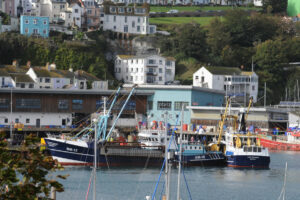
BTA is expecting its total auctioned in 2019 to be ‘somewhere between £38m and £40m’, says managing director Barry Young.
“Having had the web auction since June, it’s difficult to make any claims of how fantastic it is – it’s a short time – but we wanted to go from the shout auction to the web auction to prevent peaks and troughs in prices, and results so far confirm that. Smoothing out the prices seems possible, giving both buyers and fishermen a better chance to plan their future. To know what price the fish under auction is likely to reach helps both sides.
“To add to that, we try to stagger the landings so that gluts can’t occur – but that is not always possible, particularly at times of unexpected poor weather, when the skippers have no option but to all land at the same time.”
Having earlier this year invested in an 11-port grading machine, under the web auction BTA now offers 10 grades of Dover sole.
Barry Young added: “We are the first company in the world to auction fish through a web-based system – a similar system at the fishmarket in Urk isn’t yet in operation.
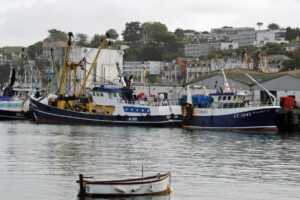
BTA’s new web clock auction is benefiting a wide range of vessels across a wide area, as well as local boats.
“I have to admit that auctioning is at present slower than we expected, but we will soon have a second clock, which should speed up the auction considerably. The web auction is a revolutionary idea. Its makers are doing their best, and the software is being better adapted, but at BTA we are delighted with the option of having a web clock auction. We are happy, as a company, that the decision we made to install the web clock will benefit all in the South West.
“Having the KOSMOS web auction has enabled changes to many aspects of the marketing of fish at Brixham. As an example, we are now getting more hake sent from Newlyn, and prices have been good. Our buyers now come from a wider area, and over the past few days, we have seen prices of hake fetch above £6.80/kg for the larger fish, with lower sizes between £3.80/kg and £3.50/kg. Such a change in the types of species auctioned at BTA is working out well, and we travel far and wide to bring fish to the Brixham market.”
How the web clock works
The BTA website (brixhamfishmarket.co.uk) explains how the KOSMOS system works.
“Prior to the start of the auction, the auctioneer logs into the KOSMOS web-based clock system to carry out his final checks. Once he is satisfied with the order of sales, he sends out a message to the fish buyers stating that the supply catalogue is complete and the auction will start. The auction starts at 6am every weekday morning.
“When the buyers log into KOSMOS, they will see the clock. They also see the current lot ready for sale, which includes all relevant information, such as the name of the boat that caught the fish, species of fish, days at sea, and the grade (both size and quality). There is also a list of upcoming lots.
“The buying audience consists of a mix of owners, agents and representatives from some of the large fish processors, local fish merchants, and restaurateurs looking for fresh, quality fish to serve onto your plates.
“Before the auction begins, the fish have been grouped by species and are sold in turn, usually starting with the Dover sole, then on to monkfish, cuttlefish, squid, scallops, turbot, brill and hake, etc.
“Depending on how many boats have landed their catch, the fish from up to five boats are grouped together for sale. This not only saves time but also ensures a better price for the prime fish.
“The auction begins with the sale of the prime-quality fish that commands the best price, and gradually works through the system until all the lots have been sold. The auctioneer starts with a price for the initial batch of prime fish from the group of five boats. The clock starts to count down, and buyers compete against each other to ensure they get the fish that their customers want, knowing that at any time someone can stop the clock and decide to buy the whole lot. Once the buyer has pressed to buy, they can tell the auctioneer how many boxes of that lot they would like to purchase.
“The auctioneer then moves on to the next group, and so on until the auction is complete and all the lots are sold. As each lot is sold, the auctioneer validates the sale. Buyers’ details are automatically sent to the BTA back office system, so that the information on each sale can be prepared and printed.
“Buyers can access and confirm this information online via the reports section of the software.
“Once the last lot has been sold, the auctioneer sends out the final message, ‘auction is now complete’.”
State of play at Plymouth
Landings are up again at Plymouth after a quieter 2018, but the industry now needs to take charge of its own future, says Dave Pessell of PTA
Plymouth Trawler Agents (PTA) reports a slight increase in fish landings nine months through the current year, and predicts a rise of ‘around 5% for the year end’, says the firm’s managing director Dave Pessell.
He added: “In 2017, sales reached £19m because of a remarkable increase in cuttlefish landings at high prices. Predictably, the cuttlefish boom was not repeated in 2018, and a significant fall in sales by £3.2m was largely accounted for by the lowest cuttlefish landings by weight since 2013.
“The year 2019 has been marginally better than last year, probably because of the temporary closure of the Looe auction market that took place this June. Much of the fish traditionally landed in the Cornish port of Looe has been sent for auction in Plymouth, while arrangements for the auction to reopen are made.
“Clearly, global warming is occurring at a rapidly increasing rate, and the need for more fisheries science is imperative as we try to deal with increasing and alarming fluctuations in fish stocks. No one should attempt to hide behind global warming as an excuse for overfishing, but equally, the fishing industry shouldn’t be blamed for the huge damage being inflicted on our seas by many nations.

Dave Pessell, managing director of PTA.
“There has never been a better time for the UK industry to shrug off its mantle as the ‘done-to’ industry, and to seize the initiative from a Marine Management Organisation (MMO) that has clearly forgotten the word ‘management’ in its title. Much as it might hurt, the industry should invest in its own future by volunteering a modest across-the-board levy to be invested in fishery science projects around the UK, selected by fishermen on a regional basis.
“Plymouth, in common with other major South West ports, has a diverse fleet of boats, ranging from beam trawlers through twin-riggers, netters and under-10s, right down to a kayak. These vessels operate in a rich mixed fishery where a small under-10m trawler may catch up to 25 different species a day. The overwhelming majority of these vessels land to auctions in Brixham, Newlyn and Plymouth, and have done so for many years.
“The risk that these vessels pose with regard to non-compliance is minimal – yet the MMO has now decided that it would be a good idea for the skippers of these vessels to acquire a smartphone, if they don’t already have one.
“They should then proceed to tie up in some imaginary, quiet spot in a busy harbour after a long and dangerous day at sea, enter up to 25 different species on their phones, and then enter the estimated weights of the 25 species, caught over two or three hauls, within an accuracy of 10% either way. They are then graciously granted permission to move to a landing berth and put their fish ashore.
“On a Sunday to Thursday basis, these catches are sold within 12 hours at auction, and a detailed sales note is duly forwarded to the MMO as a legal requirement. Obviously, no risk assessment was made by anyone who had the slightest understanding of operating small trawlers in a mixed fishery. There is far more risk of the unprecedented number of MMO officers banging their hard hats together as they check whether there are 11 pouting, or nine pouting and two whiting, in the next box ashore.”
Dave Pessell mentioned the recent inaugural meeting to discuss the future of the Plymouth fisheries complex. He said: “A widespread consultation is taking place between Plymouth City Council, Interfish Ltd, Sutton Harbour Holdings (owner of the complex) and Plymouth Trawler Agents Ltd. It will also include any business or individual likely to be affected by any planned changes.
“Plymouth City Council continues to be very supportive of the fishing industry in Plymouth in particular, and the South West in general. Sutton Harbour is the industry’s natural home in Plymouth, and we envisage a link with our neighbour the National Marine Aquarium, whereby visitors and tourists would be able to access both sites safely. We believe it could become a major national attraction, befitting a large city with a proud maritime tradition and history.”
PTA extends help to Looe fishmarket
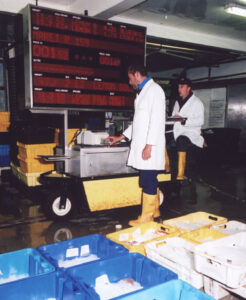
Looe fishmarket – shown in action in 2009 – was one of the first UK markets to choose electronic auctioning.
In June this year, Looe Fish Selling Ltd ceased operating the fish auction company at Looe, after a period of 32 years, and the market closed temporarily.
Negotiations have subsequently taken place between the Looe Harbour Commissioners and Plymouth Trawler Agents (PTA), resulting in a partnership agreement for the auction to be restarted in late October this year.
Dave Pessell of PTA explained: “The last owners of the auction company, Steve and Carole Farrar, their staff, and formerly Heugh Symons, provided a superb service to the fishermen of Looe, when it was never going to be easy to operate a stand-alone auction company. We wish them a long and happy retirement.
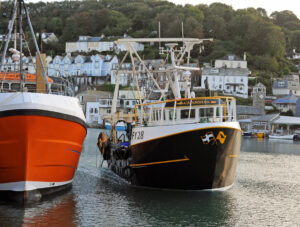
Looe trawler Guardian approaching the quay to land a day’s catch to the market.
“The decision to reopen the Looe auction was a difficult one because of the low turnover. The infectious enthusiasm and backing of the Looe Harbour Commissioners and their indomitable harbour master Tina Hicks, whose negotiating position was a refusal to understand the word ‘no’, were the deciding factors. Also, Plymouth Trawler Agents has a very supportive board of directors who will always help smaller coastal fishing communities whenever it is possible. From time to time, the Looe fishing fleet has been a longstanding supporter of Plymouth fishmarket, so it is pleasant to return a favour.
“We were also aware of the importance of fishing to Looe, with its successful fish merchants, retailers, fish and chip shops and restaurants, and the obvious link to tourism. A modest increase in quotas with the long-awaited Brexit should secure the future of the market for a long time to come.
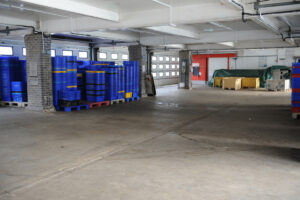
Each morning from the end of October, Looe market floor will return to normal – but the fish will be auctioned through the PTA electronic clock.
“When the market reopens, the fish will be landed and graded in Looe, and sold on a secure internet site, with the fish being offered to the same wide range of buyers who purchase on Plymouth fishmarket. Once sold, the fish will be collected or dispatched from Looe market, in the same way as it is from Plymouth.
“Fundamental to the success of the new venture will be the support of the Looe vessels that traditionally landed to their local market before it closed in June. PTA will need to ensure that prices in Looe are competitive with those in Plymouth. My goodness, we could have some interesting logistical problems if the prices in Looe are higher than those in Plymouth! You know what fishermen are like!”
Brexit leaves SW industry ‘in the balance’
With current uncertainty on whether Brexit will happen or not, Dave Pessell fears that the future of the South West fishing industry as we know it is in the balance.
He said: “Fishermen in the South West do not expect to get everything they want out of Brexit, but they do expect a fairer share of the quotas caught in UK waters. We expect that there will be a fair amount of horse-trading when the inevitable fall-out over access and quotas happens.
“With the ongoing consolidation of quota-holding within the UK fleet, the average family fisherman and boat-owner has no chance whatsoever of securing even a modest amount of extra fish. No doubt the MMO will continue to ignore the major issues it faces. The MMO has even suggested that the U10s should tender for extra quota – so it is not surprising that inshore fishermen fear that the wealthiest will succeed, and those fish will then leave the fishing communities that the MMO pretends to support.
“Whereas the overwhelming majority of fishermen want the UK to leave the EU, many merchants, particularly those who wish to export fish to Europe, wish to remain. They have understandable concerns about tariffs, catch certificates, the availability of environmental health officers, and port disruption.”
Fishing News asked Dave Pessell whether PTA, as a fish auctioning company, shared the worry of exporters.
He said: “Yes, of course we are worried. The UK fishing industry is not just about the catching sector. It has many component parts. Much of the fish we catch in the South West is exported to the EU. We would be surprised if there was not short-term disruption to our export markets, which will affect all parts of the industry. Nevertheless, that disruption will not last long, and will be worth it, because the prize of becoming an independent coastal state is immense for the UK fishing industry. Europe will want our fish.
“In summary, we will be seeking a 12-mile fishery limit for UK vessels, a fairer reallocation of quotas, and an economic link requiring UK flagships to land at least 50% of their catches into UK markets. Handled correctly, the negotiations should bring benefits for all of us. Rest assured, the EU will want our fish, dead or alive.”
Cuttlefish fishery improving
Landings of cuttlefish are increasing, says Barry Young, managing director of Brixham Trawler Agents (BTA). “However, as yet it is nothing like the boom of cuttles landed to Brixham in the autumn and winter of 2017.”

Barry Young at the helm at Brixham Trawler Agents.
He added: “With cuttlefish having started to pick up, we have more visiting boats, and we are always glad to see them – boats like the twin-riggers from Cornwall, and many visiting trawlers from further away. There are not as many Irish vessels as last year, but a couple of the Scottish boats, like Copious LK 985 and Prolific LK 986, all fishing for prime species like cuttlefish.
“Some beam trawlers have switched towards cuttlefish, with average landings of between 150 and 220 boxes per trip. Day-boats are around 20 to 30 boxes per day. Channel cuttlefish are growing in size, and are now above 400g, more towards the 500g that customers like. The size increase on cuttles is always quite fast.
“However, the boom prices of 2017 are not yet there, and demand from the Continent has dropped, so prices of over £4/kg are unlikely to return – but at present, prices like £2.50/kg are paid, which compare to those prior to the boom.
“As far as all fish landed to BTA is concerned, again we are pleased. The market of Monday, 7 October was very busy, with the total auctioned topping £450,000. But the Tuesday market, normally well below the Monday market, was still high at about £250,000 – what we would normally consider to be a decent Monday market. So the year is looking OK, and BTA expects somewhere between £38m and £40m for 2019.”

